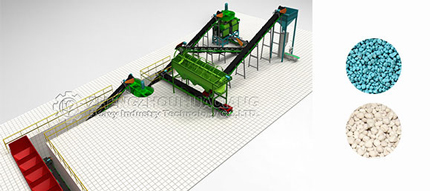During the operation of the fertilizer production line, the humid environment will adversely affect the normal operation and service life of the equipment. In particular, if the core equipment such as fertilizer granulator is in a high humidity environment for a long time, it may lead to rust of metal parts, moisture short-circuit of the electrical system, and even affect the overall efficiency of the NPK fertilizer production line. Therefore, how to do a good job of moisture-proof work is an important link to ensure stable production.

1. Keep the device ventilated and dry
Choose the location of the production workshop reasonably, avoid wet areas as much as possible, and ensure that the workshop is well ventilated. For example, an exhaust system or dehumidifier can be installed to reduce air humidity and prevent equipment from getting damp. In addition, keep the ground dry to avoid moisture and rust at the bottom of the equipment due to water accumulation.
2. Anti-rust treatment of key components
The metal parts of fertilizer granulators and other equipment, such as bearings, transmission chains, etc., are easy to oxidize and rust in a humid environment. Therefore, regular application of anti-rust oil, or the use of moisture-proof coating, can effectively reduce the corrosion damage of equipment. In addition, after the end of production, residual materials should be cleaned up in time to prevent wet fertilizer from attaching to the equipment and accelerating rust.
3. Moisture protection of electronic components
The electronic control system in the NPK fertilizer production line is very sensitive to humidity, and moisture can lead to short circuits or failures. Therefore, the electric control cabinet should be regularly checked whether the seal is good, and the desiccant or moisture-proof package should be placed in the electric control cabinet to reduce the impact of moisture on electronic components. In addition, for outdoor equipment, it is recommended to add waterproof cover or shelter measures to reduce the erosion of rain and moisture.
4. Regular maintenance and inspection
In a humid environment, the daily maintenance of the equipment is particularly important. Enterprises should develop regular inspection plans, focusing on transmission components, motors, electronic control systems and other parts susceptible to moisture, to ensure good lubrication, normal lines. At the same time, if the equipment is found to be corroded or abnormal, timely maintenance should be carried out to prevent the problem from expanding.